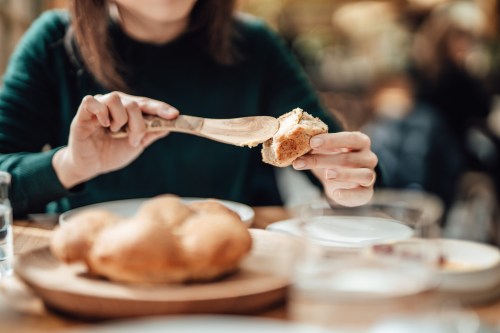11 Powerful Benefits of Cloves—And How To Use Them for Cooking, Cleaning, and More
Explore the health benefits of cloves, including their antioxidant, anti-inflammatory, and digestion-boosting properties.

When you’re filling up your spice rack, your first priorities likely are getting the basics covered. Think: cracked black pepper, garlic powder, a little cayenne pepper for a kick of heat, turmeric (for your anti-inflammatory lattes), cinnamon (for classic baking needs) and, of course, some sort of salt. These commonly-used spices will probably be the top of the rack, the jars you reach towards most when cooking, your North Star. However, there’s probably another common one you may be leaving out on your grocery shopping which you may be surprised to learn are packed with health benefits: Cloves.
Experts in This Article
registered dietitian nutritionist and owner of Amy Gorin Nutrition
a certified dietitian, nutritionist, and founder of Real Nutrition NYC
celebrity chef, certified nutritionist, and Reiki master
Cloves are the flower buds that come from a type of tropical evergreen tree native to Indonesia, that are then dried to be sold. They’ve been used for centuries in many different types of cuisines, and they’re a notable ingredient in Ayurveda and traditional Chinese medicine, too (thanks to their many pain-relieving attributes). But the benefits of cloves don’t end there. The antioxidant-rich spice also packs a punch in the nutrition department and supports the body in many different ways, including easing inflammation and supporting digestion. Here’s why you should give cloves a try.
11 key benefits of cloves
1. Cloves are packed with fiber
One of the best things you can do to ease digestion and promote regularity is to consume an adequate amount of fiber daily. Fortunately, cloves check the box in this department. “For a spice, cloves have an impressive amount of fiber,” says dietitian Amy Gorin, RDN. “One teaspoon of cloves provides close to a gram of fiber.”
2. Cloves can help regulate blood sugar levels
According to Gorin, cloves contain a mineral that can help regular blood sugar levels. “Cloves provide manganese, a mineral that can help regulate blood sugar levels,” Gorin says, which is why she recommends adding a pinch or two into your cooking to reap its benefits.
3. Cloves have antibacterial properties
Sure, there are other ways to improve oral hygiene, like using expert-recommended mouthwashes or consuming foods that promote oral health—but cloves can also lend a helping hand. “Clove oil has been investigated as an antibacterial agent1, per preliminary research,” Gorin says. “In one study, a mouth rinse containing clove, basil, and tea tree oil was found to help fight plaque and bacteria in the mouth.”
4. Cloves can help alleviate tooth pain
One of the most notable potential benefits of cloves is they can be used as an essential oil for toothaches thanks to their pain-relieving compounds like eugenol, which acts as a natural antiseptic. In fact, one study found that clove oil can help relieve tooth pain caused by dry socket.
5. Cloves have anti-inflammatory properties
Another main benefit of cloves is their anti-inflammatory properties. Past studies have indicated that the eugenol in cloves could help reduce the body’s inflammatory response. Using clove oil (or black seed oil) as a lotion or adding cloves to tea may also help combat inflammation, which can help aid in relaxing joint pain, arthritis, and other issues like muscle strains and sprains.
6. Cloves can help protect against aging
Cloves are also high in antioxidants, which Serena Poon, a celebrity chef, nutritionist, and reiki master, explains can help protect your body against the signs of aging. “The anti-inflammatory properties, epigenetic cues, and mitochondrial activity found in antioxidant-rich foods contribute to longevity and vitality,” Poon says. As such, Poon recommends sprinkling cloves into smoothies, rice dishes, or desserts as an easy way to boost your daily antioxidant consumption.
7. Cloves can be used as a cough suppressant
If you feel a tickle coming on, you may want to consider reaching for some cloves as a home remedy for a cough. “In Ayurvedic medicine, cloves are also used to suppress a cough by relaxing the throat muscles,” Poon says. To do so, she recommends chewing on the cloves directly (but not swallowing them). You can also brew them into tea and serve them with honey. Pro tip: Poon suggests adding mānuka honey for added antibacterial and antiviral benefits.
8. Cloves can work as an insect repellent
If you’re an insect magnet (as in, you’re prone to getting bug bites), you’ll definitely want to keep cloves handy because insects such as mosquitoes, ants, and wasps are deterred by the scent of cloves. “Researchers have found that a compound in cloves [called] eugenol is an effective agent for killing insects and larvae,” Poon says. “A spray bottle of diluted clove oil might serve as an effective natural pest control for your home,” she says.
9. Cloves may support skin health
Cloves as skincare? You heard that right. According to Poon, topical applications of clove oil may support skin health too. “Because of its anti-inflammatory properties, clove oil is a promising solution for relieving inflammation in the skin,” she says. “Cloves also possess antibacterial properties, which can make them useful for treating acne caused by bacteria.” Just remember to test the oil on a small patch of skin first to ensure it doesn’t cause a reaction.
10. Cloves can help soothe digestive discomfort
Using cloves to ease digestive problems is also a common practice in Ayurvedic medicine. “Cloves are said to relax the stomach lining and are used to relieve nausea, gas, and vomiting,” Poon says. To reap the benefits, she recommends brewing a tea with cloves and ginger. Then sip and enjoy.
11. Cloves have a good amount of magnesium
As well as being a boost for gut health, magnesium is known to be beneficial for sleep. It helps heartbeat regulation, digestion, and aids in relaxation; all things that help you wind down for bedtime. A tablespoon of cloves contains 5.4 mg. of magnesium, and as sleep hygiene becomes more and more important, every little bit from our diets can help.
Any there any health benefits to drinking clove water?
According to Amy Shapiro, MS, RD, CDN, a registered dietitian and the founder and director of Real Nutrition, drinking clove water can have many benefits, particularly for gut health. “Drinking water that has been steeped with cloves can help keep you stay hydrated, improve digestion, flush out bacteria, and boost immunity. Additionally, it can help decrease gas while improving the rate of digestion,” Shapiro says. Although, if digestion and regularity are the main goals, she notes that consuming enough water daily will also do the trick in most cases.
Nutritional value of cloves
1 Tbsp of ground cloves contains approximately:
- 18 calories
- 4 grams of carbohydrates
- 2.2 grams of fiber
- .15 grams of sugar
- .4 grams of protein
- 1.3 grams of fat
- 40.5 mg of calcium
- 9 mcg of vitamin K
- 1.9 mg of manganese
- .573 mg of vitamin E
- .081 mg of vitamin B6
- 6 mcg of folate
Any risks of cloves to note?
While it’s clear that cloves offer a whole host of potential benefits, like most things in life, if you overdo it, problems can ensue. Basically, moderation is everything when it comes to cloves. “If you make a batch of muffins with cloves in them and have a couple, you should be fine,” Gorin says. As such, she recommends avoiding high amounts of the spice at a time and recommends consulting with a health professional to ensure it’s safe for you to consume it in the first place.
Do cloves have side effects?
“I would actually recommend speaking with your doctor or medical team before adding cloves in medicinal doses and/or clove oil to your diet. There can be potential risks to consuming larger amounts of cloves,” Gorin says. “Children and pregnant or breastfeeding women should avoid taking clove oil or clove in medicinal doses. In children, clove oil may cause seizures, liver damage, or fluid imbalances. And since clove oil contains eugenol, which may slow blood clotting, the National Library of Medicine recommends people should avoid clove oil or cloves in medicinal doses at least two weeks before surgery, and people with bleeding disorders should avoid it altogether,” she says.
Those taking certain medications should also be wary of introducing cloves into their routines. “There may also be interactions with clove oil and medicinal doses of cloves with medications such as aspirin, ibuprofen, naproxen, and warfarin, so I’d recommend speaking with your doctor before adding a high amount of cloves to your diet,” Gorin says. Plus, she notes that the application of clove oil in the mouth or gums may cause damage to the mouth. As such, less can, in fact, be more.
What are cloves good for when it comes to the kitchen (and elsewhere)?
Now that you’re up-to-date on all the benefits and risks of cloves, you’re probably thinking: “Sounds great! But how do I actually use cloves?” Ahead, find some creative ideas to get you started.
Remember, the benefits of cloves—support anti-aging, benefits skin health, helps regulate hunger levels, and more—definitely make it worthy of a spot in your pantry. The good news? There are so many creative ways you can incorporate cloves into your diet (skincare routine or daily chores) that you won’t tire of reaching for them day in and day out.
8 creative ways to use cloves
1. Add cloves to your tea
One simple way to reap the benefits of cloves is to add them to your tea—chai in particular. Ayurvedic practitioners say cloves are especially great for the kapha dosha (your constitution) thanks to their clearing and purifying nature. But if you’re not so much of a tea drinker, coffee with spices is a heavenly combination, too.
2. Use cloves as a natural cleaner
Because of the antibacterial properties of cloves, they work great as a natural cleaner. Grab them in essential oil form and add some drops to water—along with your other good-smelling DIY cleaning product favorites—to help disinfect the surfaces in your home.
3. Add cloves to your smoothies
One quick way to add flavor to your smoothie is with cloves. “I have a pumpkin smoothie recipe I love that uses ground cloves and other warming, anti-inflammatory spices, such as nutmeg,” Gorin says. Yum.
4. Use cloves as an air freshener
If you’re a fan of stovetop potpourri, cloves make the perfect addition with their unctuous spicy scent. Combine a few cloves with a couple of sticks of cinnamon and a splash of vanilla to fill your home with a comforting, mouthwatering aroma.
5. Use cloves in your baked goods
Adding cloves to your baked goods instantly amps up the cozy vibes. “I find the warm spiciness of cloves very lovely, and I like to use it in my muffins,” Gorin says. Most fall baking spice mixes—like apple and pumpkin—contain cloves.
6. Make a pomander
Making a pomander, or as Poon calls them, “aromatic ornaments,” is another fun way you can make your home smell amazing using cloves. “These balls release a natural, invigorating scent that can uplift your space and energy,” she says. To make it, you’ll need an orange and a bag of whole cloves. “Stick the cloves into your orange, one by one,” she says. Then, you can either fill the entire outside of the orange or create a fun design. The choice is yours.
7. Dress up desserts with clove syrup
Yes, clove syrup is also a thing. Here’s how to make it: Simmer equal parts water and sugar with other spices until it’s reduced into a syrup consistency. Then, once it’s cool, you can store it or use it to top ice cream, desserts, or even cocktails. Yes, yes, and yes.
8. Make mulled wine
Cultivate all the festive vibes during the winter months by making mulled wine at home, which Poon says typically contains many different spices, including cloves.
This clove-infused herbal tincture can help relieve digestion:
Hu, Qiao et al. “Progress on the Antimicrobial Activity Research of Clove Oil and Eugenol in the Food Antisepsis Field.” Journal of food science vol. 83,6 (2018): 1476-1483. doi:10.1111/1750-3841.14180
↩︎
Sign Up for Our Daily Newsletter
Get all the latest in wellness, trends, food, fitness, beauty, and more delivered right to your inbox.
Got it, you've been added to our email list.










